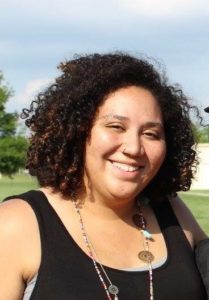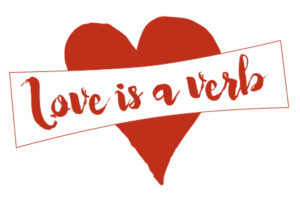 Erin Bradley volunteers full-time at two organizations through the Ameri-corp program, Public Allies. Coming from Kansas, she now enjoys the change in view and lifestyle that San Antonio provides. In free time, she enjoys being creative and involved in art, watching movies and exploring new places and activities.
Erin Bradley volunteers full-time at two organizations through the Ameri-corp program, Public Allies. Coming from Kansas, she now enjoys the change in view and lifestyle that San Antonio provides. In free time, she enjoys being creative and involved in art, watching movies and exploring new places and activities.
“Let all that you do be done in love.” – 1 Corinthians 16:14 (NRSV)
Sometimes, this world can be hard. More for some than others. Hard times fall onto families and leave them on the streets. Some families and individuals are stuck in societal cycles that keep them down — financially, educationally and socially.
We are taught and molded to harden. While maybe not said explicitly, along the way we learn to just look out for ourselves. At the end of the day it’s just us, so we don’t worry about others too much. We keep our goals and dreams in the forefront and we try not to get distracted. We train ourselves to not trust too easily, to work hard for money and success.
We are working so hard, enticed by these things, fixated on these markers of success that sometimes we forget about love.
We use the word often; so much in fact that we diminish its meaning. We say, “I love you,” and don’t necessarily mean it. We love objects over people. We become focused on one goal — ourselves — and forget all the rest.
In September of 2015, through Mennonite Voluntary Service (MVS) I began volunteering at a grass-roots non-profit in San Antonio. The organization, Inner City Development, has been a part of San Antonio’s west side for almost 50 years. I help create and run an after school program for area kids who struggle with reading. We also provide emergency services through a food pantry and clothing service.
Non-profit work can be tough. You hear heart-breaking stories. You can feel helpless sometimes. Your assignment can quickly change as gaps need to be filled; especially at an all-volunteer organization.
At Inner City, we have a large room. This is where we hold most of our meetings, games and activities during the summer program. Along the back wall, in large, colorful cut out letters is displayed one of our mottos, “What is the most loving thing to do?”
Placement seems a little strange, tucked away from the unfamiliar eye. During the year, it is directly across from my desk.
But in the summer, it graces the wall that is probably passed the most. A place all volunteers come across daily as they interact with the 100 plus children in our summer program.
Said more often during the summer, the question is a challenge our executive directors pose to us regularly. It pops up in random places; like on the small pins stuck along the window of the office or the volunteer-designed summer t-shirts.
It’s instantaneously a large and subtle reminder of our actions.
 Growing up, Christians usually are taught at church, Sunday school and sometimes home to “God is love.” Time and time again, we hear “Love your neighbor and your enemy,” and to “Love unconditionally.” Although we know this, it can be hard to put into action.
Growing up, Christians usually are taught at church, Sunday school and sometimes home to “God is love.” Time and time again, we hear “Love your neighbor and your enemy,” and to “Love unconditionally.” Although we know this, it can be hard to put into action.
In tough situations, we sometimes forget to ask oursleves, “What is the most loving thing to do?” This challenge has helped rework my life, change my point-of-view in some interactions. Over the last two years, this challenge has become prevalent in my life in a couple ways.
In San Antonio 2,981 are homeless each day. Of these, 1,243 are unsheltered and 31 percent are families with children.
Often we are conditioned to not be as trusting or generous to those who are homeless or to folks who are begging on the streets. Whether it’s family, our communities or the media, it’s a message that we seem to absorb. And with so many people on the streets, it becomes too easy to breeze right by and ignore their needs, their pleas for help.
At Inner City we strive to ensure our sack lunch program is more than just meals. We intentionally create relationships with those we serve. We sit together and talk as folks eat. We provide extra food for weekends and hard days.
This program is about way more than just food. We make it about love. And I am trying to bring this intentionality into all aspects of my life.
As I walk around town — my interactions, my conversations — I strive to base my actions in love. Even if I can’t help, I do what I can to make my actions as loving as they can be.
At Inner City my focus is the after school reading program. We work with kids in one of the most socioeconomically poor areas of the country. Working with kids can be tough. It’s really very hard sometimes to be able to take the time and make sure your actions are loving. One of my children really struggles to read and hates doing it. As we transition into reading time, it’s a daily battle.
“I don’t want to read Miss!” or “Why do I have to read?” or “I’M NOT GOING TO!” And it goes on and on.
As I am struggling and arguing with a child the thing that always crosses my mind is, “Why won’t they just listen? We literally do this every single day.”
Day after day builds up and the same thing takes place. It wears on you. I change things up, make adjustments to make our activities more interesting. I talk with them separately to make sure there isn’t more going on. But lots of times, even after all that, I still face protests, arguing, frustration. It can be discouraging.
But kids need love.
All kids need love.
And I love all of my kids.
But acting in love is sometimes a different story.
Sometimes one child needs a little more than others. It can be difficult. Repeated actions of a single child can rub you the wrong way. The actions of an entire classroom can be tough to deal with. But it is a necessity. To treat each and everyone with love.
“Love and compassion are necessities; not luxuries. Without them humanity cannot survive.” – Dalai Lama.
Sometimes the love isn’t as apparent. Maybe it tough love; such as calling a parent and discussing behavior, suspending someone from the program. But other times, it’s as simple as taking a few moments each day to talk with each child.
“How was your day?”
“What did you do this weekend?” I want them to know that I care about their lives, even outside of their academic successes.
Of the many things I’ve learned in my time so far at Inner City, rooting my actions in love has had the greatest impact. It has reconnected me to my faith; reconnected me to myself. It is a challenge I accept daily.
So I pose to you the challenge I read on the wall at the Inner City every day;
“What’s the most loving thing to do?”


